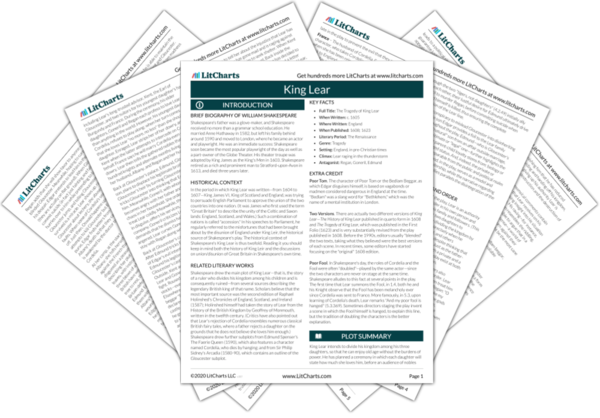Summary
Analysis
Kent returns in the disguise of Caius, a commoner, to offer his services to Lear. Lear accepts. He sends Kent to fetch his Fool.
As in 1.1, Kent demonstrates his deep loyalty to Lear's authority, which empowers him to go outside of the usual order of political business. Lear's failure to recognize Kent in his disguise provides a dramatic metaphor for his general failure to see reality, in particular his daughters' true colors.
Themes
Literary Devices
Quiz
Test Yourself
Seeing Oswald, Lear attempts to summon him, but Oswald ignores him. Irritated, Lear sends a Knight to call Oswald back. The Knight returns with the message that Goneril is not well and that Oswald refuses to obey Lear—the Knight thinks that Lear has been "wronged" (66). Lear sends the Knight to fetch his Fool. Both Knight and Lear observe that since Cordelia's departure for France the Fool has been melancholy and sad. Oswald enters again. Lear summons him and demands that Oswald say who Lear is. When Oswald replies, "my lady's father" (1.4.79), Lear grows enraged, calling him a "dog," "slave" and "cur" (81), and hitting him. Kent joins in tripping Oswald.
Lear's demand to have Oswald acknowledge who he is—that is, the king (or former king)—draws attention to the fact that sight and recognition are part of authority and order, insofar as the leader and the subject must see and acknowledge each other for what they are if the system is to function. Lear's treatment in Goneril's house violates both the private respect she as a child owes her parent and the traditional order of official hospitality, and it certainly doesn't meet Lear's (foolish) expectations about what would happen.
Themes
Quiz
Test Yourself
The Fool enters. He tells Lear to wear his (the Fool's) coxcomb (or fool's hat). He continues to tease Lear, who finally asks whether the Fool is calling him a Fool. The Fool replies that indeed he is: "all thy other titles thou has given away. That thou wast born with" (152-4). The Fool continues to mock Lear, saying that Lear is worth even less than he is: "I had rather be any kind of thing than a Fool. And yet I would not be thee […] I am a Fool. Thou art nothing" (189-99).
Traditionally, the Fool had the unique privilege of stepping outside of, and even inverting, the order of the court by criticizing the King. Speaking in mad, riddling language, the Fool makes insightful comments about Lear's diminished condition. The Fool's use of the word "nothing," echoing Lear, Cordelia, and Gloucester, stresses that Lear has destroyed himself in the process of dividing his kingdom.
Themes
Literary Devices
Quiz
Test Yourself
At this point, Goneril storms on stage, irritated. She blows up at Lear, criticizing the Fool and all of Lear's knights for disturbing the peace in her house. Goneril scolds Lear, telling him he must return to his usual self. Lear, incredulous, jokingly demands whether anyone present recognizes him (i.e., as their former king). "Who is it that can tell me who I am" (1.4.236) But Goneril cuts him off, demanding that he reduce the number of knights with him from 100 to 50. Lear flies into a rage cursing her as a detested kite" (or bird of prey; 1.4.274) and pleading the gods either make her infertile or to send her a "child of spleen" (296) so that she herself can know "how sharper than the serpent's tooth it is/ to have a thankless child" (302-3). Lear and his knights exit, preparing to depart for Regan's house. As they go, Lear tries, in vain, to stop crying at the loss of his daughter: "Old fond eyes,/ Beweep this cause again, I'll pluck you out" (317-8). Lear shouts that when Regan hears of Goneril's unkindness she'll "flay" Goneril's "wolvish visage" (325). He rushes out.
Lear seems to think that he was king by virtue of being himself, rather than by virtue of his power, and that therefore he could give up power but still demand respect. Now he is discovering that in giving up power he has given up his former identity. Lear curses Goneril using animal terms ("kite," "serpent's tooth," "wolvish visage"). The implication in Lear's use of these insults is that Goneril is an animal because, like an animal, she lacks the tender familial bonds of love that make humans unique. The fact that his curse focuses specifically on the idea that Goneril be without children—or, like him, have only thankless children—stresses how hurt and angered he is by his daughters' ingratitude.
Themes
Literary Devices
Quiz
Test Yourself
Get the entire King Lear LitChart as a printable PDF.

As Lear departs, Albany enters, tentatively criticizing the lack of hospitality that Goneril has shown to her father. Goneril cuts him off. She summons Oswald, double-checks that he has written a letter to Regan, as she instructed, and orders him to bring it to Regan quickly. Then she turns back to her husband, telling him that he is foolish to be so gentle. Albany remains dubious: "How far your eyes may pierce I cannot tell./ Striving to better, oft we mar what's well" (368-9)
Although Albany is bound to Goneril through the laws and customs of marriage, and his political power depends on her, Albany's clear vision of her cruelty to her father starts to drive him away from her. Their opposing viewpoints on the treatment of Lear, among other things, will break their marriage by play's end.
Themes
Quiz
Test Yourself












